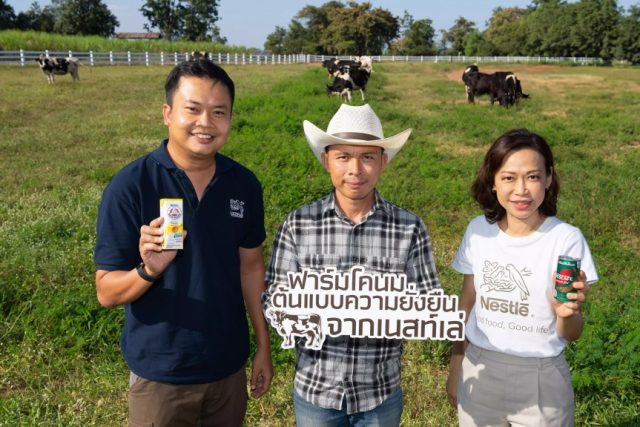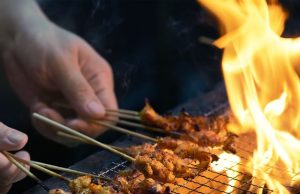Nestlé (Thai) Ltd. recently showcased its sustainable model for dairy farming based on Regenerative Agriculture practices to help protect the environment and reduce the impact of global warming. Following this sustainable model will help increase farmers’ incomes by improving the quantity and quality of the milk they produce, while meeting consumer demands by using high-quality raw materials from sustainable sources to produce tasty and nutritious products for Thai consumers.
Thailand currently produces around 2,800 to 3,000 tons of raw milk per day. While the market for total liquid milk products has grown by 7% over the past year, raw milk production is declining due to the rising cost of animal feed, the impact of global warming, and a decreasing number of dairy farmers. Due to a lack of systematic farm management, the dairy industry is also a major source of methane gas emissions. As a leading global food and beverage company, Nestlé recognizes these challenges, which is why it partners with dairy farmers to promote sustainable farming practices through Regenerative Agriculture. This approach to managing dairy farms helps them become more efficient while improving the quality and quantity of raw milk, reducing costs for farmers and protecting the environment.
Ms. Salinla Seehaphan, Corporate Affairs Director, Nestlé (Thai) Ltd., said, “Raw milk is an essential ingredient for Nestlé to produce well-known products under popular brands such as MILO, BEAR Brand, and NESCAFÉ. This is why we prioritize high-quality raw milk from sustainable sourcing that minimizes environmental impacts. Nestlé has implemented a project to reduce greenhouse gas emissions on dairy farms, an important part of the company’s ambition of achieving Net Zero by 2050. We are proud that 100% of our raw milk meets sustainable sourcing standards. Nestlé will continue to pass on goodness to consumers, ensuring we deliver the highest-quality products while protecting the environment and improving the quality of life for Thai dairy farmers.”
Sustainable model for dairy farming
The dairy industry generates methane emissions that can potentially impact global warming 26 times more than carbon dioxide (CO2) does. To address this, Nestlé has been working with Thai dairy farmers for more than 40 years to transform the industry by promoting Regenerative Agriculture practices. These practices include protecting and restoring soil fertility to enhance biodiversity and water resources that ensures a steady source of cattle feed; replacing chemical fertilizers with dried cow manure as organic fertilizer to reduce environmental impacts; using solar energy as a renewable energy source; and restoring the environment in plantation plots to replenish natural resources.
Mr. Sirawat Pintadis, Agricultural Services Manager, Nestlé (Thai) Ltd., who worked onsite and closely with farmers, revealed that Nestlé was the first to introduce Regenerative Agriculture practices to dairy farms. Regenerative Agriculture focuses on three key areas for comprehensive dairy farm management: 1. Developing effective feed and nutrition management, 2. Efficient farm waste management, and 3. Supporting the use of renewable energy.
Said: “We advise farmers to plant various types of beans and plants in forage grass plots for cows to supplement their diet with protein nutrients. This increases average output to 13.5 kg. of raw milk per cow per day, which is higher than the national average of 11.7 kg. per cow per day. It also improves the nutritional value of raw milk, as protein levels have increased from 2.94% in 2023 to 3.02% today. A protein level in milk above 3% reflects a cow’s healthy condition, which can boost the nutritional benefits for consumers. In addition, planting multi-crops enhances biodiversity for the grassland while protecting and restoring the soil and overall farm environment.”
Nestlé also encourages farmers to manage cattle manure efficiently by drying it. Once dried, it can be used as an organic fertilizer to increase soil fertility for forage grass plots. Some of the manure can be sold, generating another source of income. Transforming waste from “manure to money” can add 40,000 baht to a dairy farmer’s annual income. Nestlé also supports installing biogas wells for composting cattle manure, using the resulting methane gas as a source of household energy. This approach efficiently manages farm waste while significantly reducing carbon emissions from animal manure. Drying the manure prevents fermentation and reduces methane production, contributing to a more sustainable farming system.
“Some dairy farms still face energy infrastructure challenges, such as being inaccessible or having an unstable electricity supply. To address this, Nestlé encourages farmers to install solar panels to pump groundwater into their pastures, ensuring reliable year-round access to water sources. This has helped many farmers reduce energy costs while providing electricity for household use. All of these Regenerative Agriculture practices in dairy farming helped reduce carbon emissions by approximately 2,000 tons in 2022 when compared to 2018,” added Sirawat.
Mr. Worawat Viangkaew, a representative of dairy farmers in Phimai District, Nakhon Ratchasima province, highlighted the key challenges in dairy farming. They include limited access to electricity, declining milk yields from cows, reduced quality of raw milk, and the rising cost of concentrated feed. These issues have contributed to a decrease in the number of dairy farmers.
“I started my dairy farm in 2018 and joined Nestlé’s program in 2021 as a member of Phimai Dairy Cooperative Limited. Nestlé’s agronomists visited our farms, discussed the problems we face, then helped find ways to increase yields by introducing Regenerative Agriculture practices. Under this program, we initiated a pilot dairy farm with multi-species plots of Ruzi grass mixed with legumes. We also built biogas systems, began drying cow manure, and installed solar panels as the electricity grid has not yet reached the area. The pilot farm now operates entirely on solar power, uses groundwater to maintain grass plots year-round, and generates additional income by selling dried cow manure,” he said.
By adopting Regenerative Agriculture practices, farmers have enhanced their knowledge about livestock farming and now supply raw milk to Nestlé fully certified under GAP (Good Agricultural Practices) standards set by the Department of Livestock Development. To date, Nestlé has educated over 160 farmers from three cooperatives on Regenerative Agriculture techniques and inspired more than 40 dairy farmers to adopt these practices. To support these farmers, Nestlé ensures a reliable market by purchasing raw milk from them through Dairy Cooperatives Limited at a fair price in line with established purchasing standards.
Leading Thai dairy farms towards the Net Zero goal
Nestlé remains committed to driving its “Good for You, Good for the Planet” strategy while promoting Regenerative Agriculture practices focused on protecting, renewing, and restoring the environment, as outlined in its sustainability roadmap for Net Zero 2050. The company will continue developing and delivering high-quality and tasty products to Thai consumers under brands including MILO, BEAR Brand, and NESCAFÉ, all made using raw milk sourced from sustainable farming.













